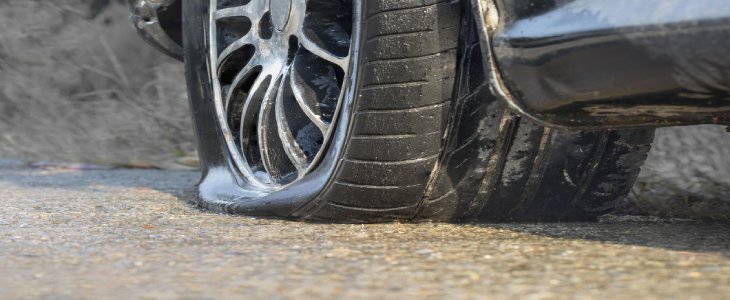A tire blowout can spell disaster, even at low speeds. Multiple motorists, including the driver of the vehicle, can easily be injured or killed. However, liability for tire blowout accidents in the Philadelphia area is not always so clear. Sometimes a tire manufacturer or retailer can be held responsible, while in other cases blame lies with a mechanic or even the driver. These cases are complex, which is why hiring an experienced tire blowout accident attorney is critical.
Cooper Schall & Levy represents clients who have been injured because of tire blowouts throughout Pennsylvania. We also help victims’ families in cases where the tire blowout accident causes death. Serious accidents demand serious legal representation, and that’s the level of service you can count on from our dedicated personal injury attorneys.
Reasons Tire Blowouts Happen
As with any type of automobile accident, understanding the series of events leading up to a tire blowout is necessary to establish liability. A thorough investigation may be needed to uncover why exactly the tire failed. Our experience has shown that these are the most common reasons tire blowouts occur:
Manufacturer errors. Tire recalls are nothing new, and that’s because manufacturer error is often to blame. These errors typically take one of two forms: design defect or manufacturing defect.
A design defect happens when the materials or adhesives used in the manufacturing process are not suitable for use. That means the design itself, not the way the particular tire is actually produced, is responsible. Tires are composed of rubber, fabric, and steel, and held together by special adhesives. The tire has to be able to withstand substantial abuse from the road: high speeds, heat, potholes, and much more. One of the most common reasons a tire fails is tread separation, which happens when the tread separates from the casing.
On the other hand, a manufacturing defect takes place when the tire is assembled incorrectly or with some flaw. The design may be perfectly fine, but mistakes can happen on the assembly line. Any mistake in the way the tire is put together can lead to a blowout.
Driver errors. While most tire blowouts are due to manufacturer error, there are cases in which the vehicle’s driver can be held responsible. These are typically cases in which one of these factors is to blame:
- Improper tire pressure. Either too much or too little air in the tire can make it unsuitable for road use and cause a blowout.
- Too much weight. Sometimes, excessive weight can put undue pressure on the tire and cause it to fail.
- Improper maintenance. Tires don’t last forever, and if a bald tired is not replaced with a properly tread one, an accident may occur.
Who Is Liable For A Tire Blowout Accident?
Manufacturers, retailers, mechanics, and drivers all owe certain duties to motorists when it comes to the tires they make, sell, service, and use. Failure to abide by these duties may indicate negligence. This is where the issue gets more complicated, because one or all of these parties may be to blame.
A tire manufacturer can be held liable for a design or manufacturing defect. Manufacturers have a legal duty to produce and sell products that are reasonably free of errors. That means not selling tires that have defects which are, or should be, known or foreseeable. The manufacturer may be required to take certain steps, such as issuing a recall, if it knows or should know about some error with their products.
Tire retailers can also share some of the blame for defective tires. If a tire is not stored properly – for example, if it’s exposed to heat or sunlight – the materials in the tire can be compromised. Retailers that know or should reasonably know that the tires they sell are defective may be held responsible for a blowout.
Drivers owe certain legal duties to others on the road. One of those duties is to properly inspect and maintain their vehicles, including their tires. A driver who knows, or should know, that a tire is bald, improperly pressurized, or otherwise defective can be held partially liable for a blowout. This is true even if the tire manufacturer or retailer is to blame.
In addition, automobile mechanics can be held responsible in some cases. A mechanic who knows about or should have seen a defect in a tire might be to blame in case of an accident. This is especially true where the defect would not be detectable to an untrained eye.
Finally, if a tire blowout is caused by a road defect, such as a pothole or debris on the road (e.g. gravel), a personal injury lawsuit can be filed against the local or state agency responsible for road and highway maintenance.
Since multiple people can share responsibility for a tire blowout, these accidents tend to be challenging. If the injured driver was partially to blame for his or her own accident, it could decrease their eligible damages after an accident. For example, if a jury determines that the driver was 40% liable due for the accident, his or her damages will be decreased by 40%.
It’s important to note that a driver can only recover as long as he or she was not more negligent than the defendant. In other words, if the driver is determined to be over 50% at fault for the tire blowout, he or she cannot recover any damages.
How Can Cooper Schall & Levy Help Me?
With so many potentially liable parties, it’s important to have a law firm that understands Pennsylvania negligence law. Moreover, you need an attorney who knows how to conduct an exhaustive investigation into the causes of your tire blowout. Parties will start pointing fingers at each other, and possibly you, as they attempt to deflect liability.
Our legal team will use the available legal tools at our disposal to uncover all of the evidence in your case. We also have a network of expert witnesses who can testify as to complex technical subjects regarding the reasons for the tire blowout.
If you or a loved one were injured in a tire blowout accident, turn to Cooper Schall & Levy. Contact our office today to schedule your confidential consultation.
Cooper Schall & Levy personal injury lawyers serve Philadelphia, Pennsylvania as well as neighboring counties such as Montgomery County and Delaware County and cover neighborhoods such as Norristown and Drexel Hill.


